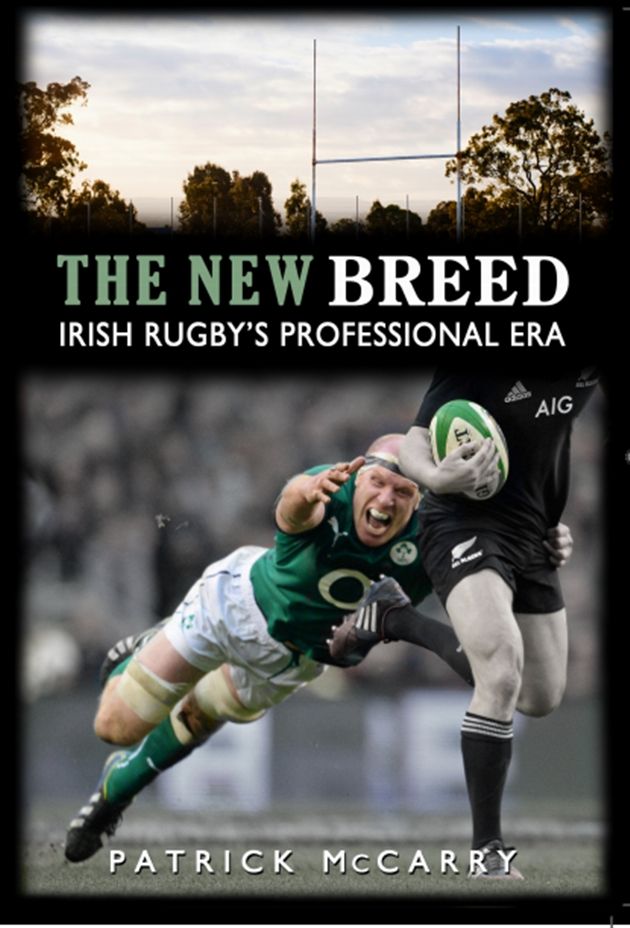No-hopers to world-beaters.
On August 26, 1995, elite rugby turned from purely, proudly amateur to professional.
The IRFU were against the idea but had to move with the flowing tide.
‘The genie was out of the bottle and we couldn’t do anything about it,’ declares former Ireland international, and IRFU chairman, Syd Millar.
Ireland were caught on their heels, for over five years, as many of their top stars flocked to England’s Allied Dunbar Premiership.
There was a very real threat – especially after Ireland were soundly beaten, twice, by South Africa in 1998 – that they would be cut adrift from the world’s top sides – New Zealand, South Africa, England, Australia and France.
The IRFU eventually woke up to the threat and were instrumental in getting top Irish players home, as well as establishing the Celtic League.
15 years after the formation of that league, Ireland are reigning Six Nations champions, second in the world and targeting their best ever World Cup.
As detailed in the book, The New Breed: Irish Rugby’s Professional Era, here are six of the most important steps along the way.
Warren Gatland appointed
The IRFU appointed the 34-year-old New Zealander, in 1998, off the back of two promising seasons as Connacht coach.
Gatland comes up with simple but effective game-plans, plays a key role in convincing big stars – Keith Wood, Malcolm O’Kelly, David Humphreys – to return to Ireland, and gives youth a chance.
In 2000, he gives John Hayes, Shane Horgan, Simon Easterby, Peter Stringer and Ronan O’Gara their debut. They would form the backbone of the team for the next eight years.
Irish fitness goes through the roof
‘There was a phrase at the time,’ recalls former Ireland lock Gary Longwell, ‘”Are you a camper or a climber?”‘
Campers were happy to make a little effort and enjoy the view. Climbers were determined to press on.
Ireland was full of campers in the late 90s but the appointment of Liam Hennessey as Ireland’s head of fitness changed everything.
Part of the fitness drill, in the Gatland-Hennessey era, involved gruelling fitness camps in Spala, Poland.
Munster strength and conditioning coach Aidan O’Connell recounts, ‘You talk to any of the older players and that defined them in the early stages. It was a three-week camp and an infamous one, because it went on for so long … The stories I heard back from the guys – people were crying going back into it.’
The 2001 British & Irish Lions Tour
Brian O’Driscoll confirmed his place alongside Keith Wood as a genuine, world-class star during the trip Down Under.
The tour opened O’Driscoll’s eyes to what Ireland needed to do to reach the next level in Test rugby.
It was not just O’Driscoll.
Donal Lenihan, who managed the Lions on that tour, says, ‘Ronan O’Gara, for example, was six months younger than Jonny Wilkinson, but was blown away by him. His jaw hit the ground. It was like a light bulb going on – that is what professionalism is all about.’
Munster come to the fore
“Rags, who had been around the squad for a couple of seasons, stood up and said, ‘We want to win the European Cup.’ People burst out laughing – that was the general atmosphere.”
So recalls David Wallace of a goal-setting meeting Munster held before the 1997/98 season.
However, within four years Munster were contesting a Heineken Cup final. Within a decade they had won two.
Ulster planted a flag in Europe, in 1999. Munster picked up the flag and charged with it.
Four proud provinces
The infamous Johnstown House, Enfield meeting of December 2008.
Rob Kearney stood up and gave his opinion, that Munster’s players may not be trying as hard as they did in the Irish jersey.
‘Did we come to blows?’ Kearney reflects.
‘No. I wish we had come to blows, because what was said was more awkward. I’d have preferred to have been in a fight.’
Marcus Horan and the Munster lads flipped the lid but the debate it sparked brought the team closer. Ireland won a Grand Slam three months later.
Joe Schmidt takes it up a notch
“Joe tells you exactly what he wants from you – accuracy, all-round game, looking for work, being sensible with your plays, making the most of yourself. Those were the things drilled into me during the autumn and pre-Six Nations camps.
“He expects perfection. Those training sessions are intense.”
Andrew Trimble on Joe Schmidt – the man that personifies professionalism and has led Ireland to Six Nations titles in 2014 and 2015.
Pat McCarry is the author of The New Breed: Irish Rugby’s Professional Era (Mercier Press). The book is being officially launched at Hodges Figgis, Dawson St., Dublin 2 from 6pm this evening. Copies are available to buy here.

































